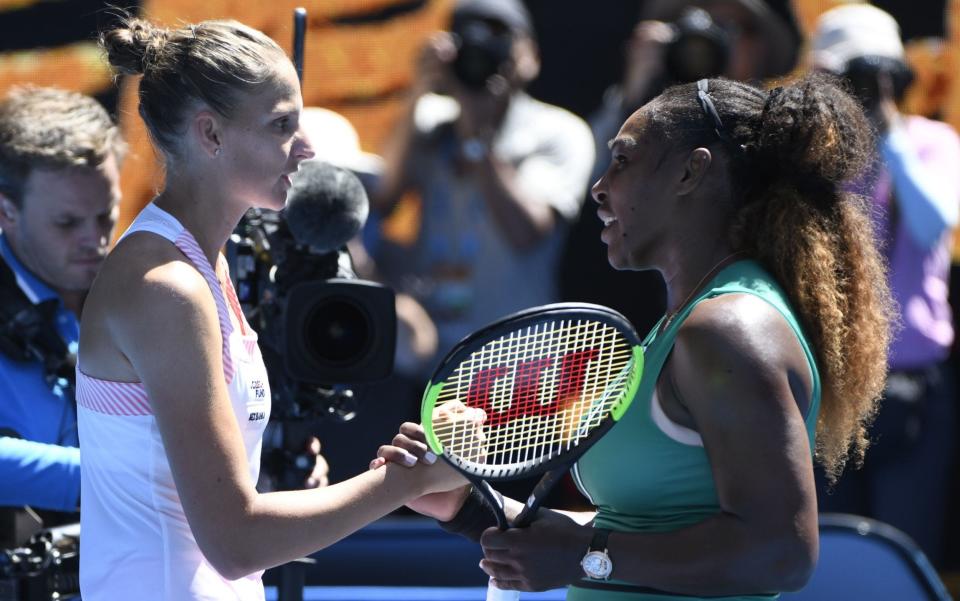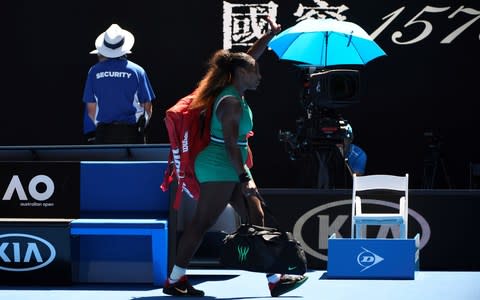Genuine sportsmanship is rare, but Serena Williams displayed it in Australian Open exit

Four months have elapsed since Serena Williams lost her cool and the US Open final. In that time, just about everyone with a passing interest in tennis, race or gender has passed judgment on Williams’ behaviour that night. It has been a bitterly contested debate.
In the aftermath of Williams’ latest grand-slam exit - at the Australian Open to Karolina Pliskova - there can surely be no argument. Forget the forehands and backhands, Williams displayed a level of sportsmanship rarely seen in elite-level competition.
Leading 5-1 and up match point at 40-30 on her own serve, Williams turned her ankle. She managed to finish the match but didn’t win another game or even a further point on her own serve. That’s Serena Williams, the greatest server of all time, broken to love twice in succession. The likelihood of that happening in normal circumstances is similar to Lionel Messi going a season without scoring.
Williams could barely serve, but she soldiered on and refused to call the trainer. After the match she dismissed the idea that the injury was a factor in her defeat. The first three questions of the post-match press conference were about her ankle, but Williams refused to play ball. “My ankle seems to be fine... I think she just played lights out on match point… I didn't feel like I needed it [the trainer] or I didn't feel like it would be a big deal… it was fine.” Williams then spoke at length about how well her opponent had played.
This was Pliskova’s moment, and Williams didn’t want to make it about herself. This is what genuine sportsmanship looks like.
Serena Williams rolled her ankle and never recovered after being up 5-1 in the 3rd..she could barely run #ausopenpic.twitter.com/ZYgHMYW4Pv
— Zach (@zac13_) January 23, 2019
Sportspeople are often fawningly described as displaying “nice touches” and “classy gestures” - invariably at moments where they have just won or are winning. Take Williams herself earlier on in the tournament when she consoled a tearful Dayana Yastremska at the net having just handed out a 6-2, 6-1 beatdown. Was this really amazing sportsmanship? Or was it not more common decency? There are surely very few people who having just secured a thumping victory wouldn’t show kindness to a vastly inferior and less successful opponent who was visibly distraught.
Graciousness in defeat is much more elusive. Just ask Williams’ male GOAT counterpart Roger Federer. Often hailed as a beacon of sportsmanship, Federer - understandably - finds it far more difficult to be generous when he has just been beaten. Tomas Berdych for instance was enraged by Federer breaking one of the locker room’s golden rules and blaming a Wimbledon defeat in 2010 on injury. When Federer lost to John Millman at the US Open last September, he credited his opponent but also made numerous mentions of the unfavourable weather conditions and the stadium roof. A month later Federer revealed that he was hampered during the summer by a hand injury.

Federer is far from alone - Sir Bobby Robson's suggestion that Arsene Wenger and Arsenal “needed to learn how to lose” could have been directed at about 99 per cent of the Premier League fraternity.
But Federer is an important reference point because he serves to illustrate that even the most ordinarily sporting individuals can lose their sense of perspective in defeat. This should hardly come as a surprise given that we are talking about manically-driven, high-achieving individuals reacting to occasions charged with levels of emotion and pressure beyond most of our comprehension.
That is why moments of genuine sporting behaviour are rare. Williams gave us some today.

